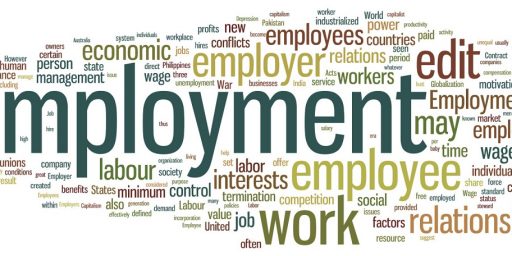FREE TRADE TRUTHS
Irwin Stelzer makes a good point about the politics of free trade:
The hundreds of thousands hired by Wal-Mart probably don’t realize that their jobs depend on their employer’s continued access to Chinese goods. But the 300,000-500,000 U.S. workers who lost their jobs over the past three years as a result of the “relocation of U.S. production to overseas affiliates” are certain that low-cost Chinese labor and the undervalued currency are the source of their woes. And they don’t care that job losses due to such relocations come to only 0.1 percent of employment per year.
Indeed not. And, of course, one would guess a goodly portion of people who lost their jobs for reasons other than overseas competition think they lost them to the Third World.
(Hat tip: Daniel Drezner)






It’s no secret, I suppose, that while we all love Walmart as much as we like a good bargain, Walmart is sucking our small communities dry while weakening our position as a super-power.
When you put in a super-sell-it-all retail center, you knock the pudding out of mom & pop shops who can’t compete with the machine that Walmart is. Just yesterday, I was waiting for my wife to exit the restrooms… I was listening to the constant beep-beep-beeptiy-beep of the check out lanes processing transactions. I guess the average item out the door at walmart is probably $6 or $7. Just listening to the frantic beeping – at one super center – it blew my mind when I multiplied that by 3, the number of Walmarts I can drive to within 30 minutes of home. There are 1000’s of stores around the world doing similar business, all of it feeding back into Walmart – and for a large ammount of the products they sell, back into China.
So, what do we have? Centralization of the retail to customer interface, which with it brings some homogenaity. So while you improve the efficiency of your shopping experience, you loose the local flavor. But while I’m saving $.30 on a soft drink, how much money am I funneling to the Chinese military?
I have tried to buy only American made products – couldn’t do it, just not enough basic ammenities still manufactured in the U.S. of good quality. Then I tried buying things only from countries whose political agenda I agree with. After picking through about 7 shirts to find one I liked, only to find it was made in China… I gave up. I can conveniently displace the blame and some of the guilt to the retailer who buys the goods from China in the first place, but I still feel that twinge that reminds me that slave prison labor and sometimes child labor produces the goods streaming out of China.
If you think about it, for every cent we pay in state sales tax, and every dollar we pay in federal tax, we probably come close to equalling a quarter of that in money we send to the Chinese government by way of purchases.
Short of making generous donations to our own defense department, we’re funding the Chinese rise in status to that of super power. But, if we believe in free-market economics, there’s not much else to say about it.